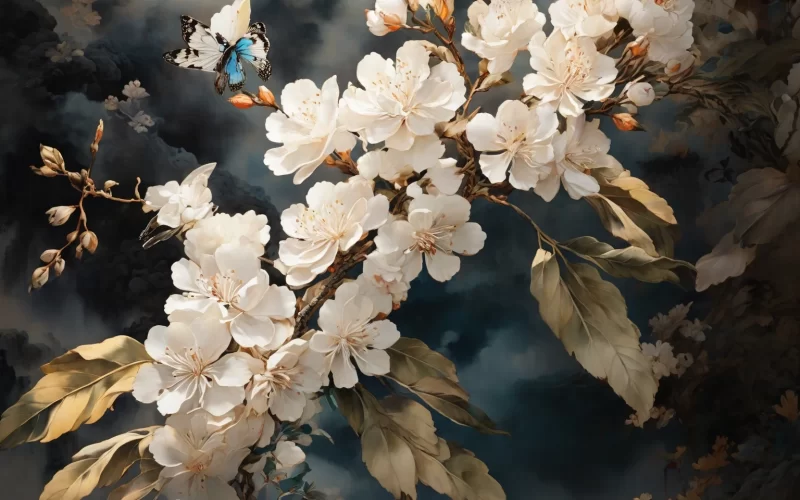The moon, grown full now over the sea, Brightening the whole of heaven, Brings to separated hearts The long thoughtfulness of night. It is no darker though I blow out my candle. It is no warmer though I put on my coat. So I leave my message with the moon And turn to my bed, hoping for dreams.
Original Poem
「望月怀远」
张九龄
海上生明月,天涯共此时。
情人怨遥夜,竟夕起相思。
灭烛怜光满,披衣觉露滋。
不堪盈手赠,还寝梦佳期。
Interpretation
Composed during the High Tang period while Zhang Jiuling served as chancellor, this poem uses the moon as a lyrical motif to express profound yearning. While ostensibly about missing distant loved ones, its deeper currents reveal the poet's concerns for ideals, kindred spirits, sovereign, and national destiny. The title's "longing afar" encompasses both specific individuals and lofty aspirations, with moonlight illuminating the poem's emotional depth.
First Couplet: « 海上生明月,天涯共此时。 »
Hǎi shàng shēng míng yuè, tiānyá gòng cǐ shí.
Over the sea rises the luminous moon; Though worlds apart, we share this selfsame glow.
The majestic opening image of moonrise over water mirrors the vastness of separation. The paradoxical "shared glow" establishes the poem's central tension—physical distance bridged by celestial connection—creating a profound emotional foundation.
Second Couplet: « 情人怨遥夜,竟夕起相思。 »
Qíngrén yuàn yáo yè, jìng xī qǐ xiāngsī.
Lovers grieve the night's drawn-out hours, While wakeful longing spans the dark.
The mood shifts from contemplation to restless emotion. The "drawn-out night" becomes temporal counterpart to spatial "worlds apart," with "wakeful longing" embodying love's persistent ache.
Third Couplet: « 灭烛怜光满,披衣觉露滋。 »
Miè zhú lián guāng mǎn, pī yī jué lù zī.
Candles snuffed to cherish moonflood's grace; Robes donned, I feel the dew's embrace.
Physical actions manifest emotional states. The poet's moonlit vigil—extinguishing artificial light to commune with nature's radiance, then discovering dawn's damp arrival—captures love's bittersweet communion with absence.
Fourth Couplet: « 不堪盈手赠,还寝梦佳期。 »
Bùkān yíng shǒu zèng, hái qǐn mèng jiā qī.
This moonlight cupped in hands can't be sent; To dreams of reunion now I'm bent.
The heartbreaking conclusion transforms celestial beauty into unbridgeable distance. The impossibility of sharing "cupped moonlight" leads to compensatory dreaming, where reality's lack finds temporary reprieve.
Holistic Appreciation
The poem demonstrates meticulous structural composition, progressing from scenic depiction to emotional expression, then from emotion to dreamscape in layered development. Its cyclical emotional resonance alternates between luminous freshness and delicate melancholy. The opening couplet establishes expansive imagery with profound sentiment; the central couplets transition into intimate personal reflection with authentic emotional depth; while the concluding couplet masterfully blends reality and illusion, returning to the "propitious moment" within dreams to lodge aspirations in the ephemeral. Maintaining graceful tonality with far-reaching implications, the work achieves both subtle profundity and sublime artistic vision, functioning simultaneously as romantic verse and idealistic anthem.
Artistic Merits
This composition exhibits perfect equilibrium between formal precision and organic expression, conveying authentic emotion through nuanced language that creates exceptional musicality and rhythmic flow. Classical allusions integrate seamlessly, with references to canonical works like "Lunar Rhapsody" and "Imperial Response Verse" incorporated with flawless naturalism. The dynamic interplay between tangible and intangible, kinetic and static elements produces imagery of remarkable clarity and depth. Technically, the poet employs object-personification and scenery-enhanced emotion, transforming the luminous moon into an emotional vessel that elevates personal yearning into universal human experience, achieving both distinctive individuality and collective resonance.
Insights
The work illuminates how life's journey intertwines emotional bonds with idealistic perseverance. The surface theme of lunar contemplation masking distant longing actually conveys deeper philosophical yearning and principled contemplation. It articulates not merely nostalgic affection for absent loved ones or intellectual companions, but implicitly addresses political idealism's pursuit and disillusionment. When confronting insurmountable reality, the celestial orb becomes a dual vessel for both sentiment and aspiration, reminding isolated souls how poetic imagination can preserve spiritual warmth and moral steadfastness.
Poem translator
Kiang Kanghu
About the poet

Zhang Jiuling (张九龄), 678 - 740 AD, was a native of Shaoguan, Guangdong. He was a wise prime minister who was upright and upright in discussing the government and wrote a lot of poems that were light, cozy and far-reaching.












